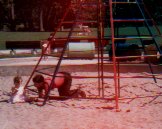
Title Goes Here
by Whoever
Title Goes Here
by Whoever
So then you start writing about your show, about why someone should attend. Be sure to toss in that you did Cold Toast last year, and even that you've been a volunteer. This can be important currency to lure that audience. You can mention when you get press (and since a website is in your control, unlike the blurb at the Fringe site, you can update it as new press comes in), like the article in the Concordia Link last year, Bitter waitresses and their stories, or the brief mention of Cold Toast in that article last year the in Plattsburgh Press-Replublican. If the Fringe actually gets the Buzz up in a timely manner this year (and if only they put in hooks so you could link to specific Buzz) you could point people to Buzz about your show. One could even just type it in on the webpage, but then there's always the suspicion that you are making it up.
You can even give away tickets, for the first three emailers or whatever. Or announce something sudden, like how you'll be appearing at the Beer Tent the next day. Or post that photo when you show up in costume at the Beer Tent.
You can even put your flyer online, and ask people to print it out and put some up. This relies on the rest of the site, that you can convince people that they ought to help out. Grab it here. It's in pdf so it will print as originally intended, but I just tossed it up there. Better if handbill size to issue the pdf so it has multiple copies on the page, or have a full size poster there.
The troupes that have websites have tended to be around for a while. But they are terribly graphic intensive, looking slick and too difficult to slap something on as it happens. Or worse, some guy is doing it for them, so they don't have control over their own space.
But key to all this is to not make it a sterile site that isolates you from the potential audience. You took the infobooth job last year in order to promote your show, so you see the point of that direct contact. But as the Fringe makes it easier for people to come to a specific show, the troupes need to reach them before they get to the Fringe. Information helps, but too often the webpages don't convey the essence of the show or performers, and that is often a key thing to getting the audience in.
There is no excuse, and hasn't been for years, for any show at the Fringe to not have their press release on the web as a bare minimum, so everyone can see it directly rather than have it watered down by the press, or not seen at all because the show doesn't get mentioned in old media. But once you start putting the press release out in public view, you realize that many are sterile, and have the facts but expect the writers to rework it. One might as well write it to attract the audience in the first place.
However, given that press releases are written anyway, better to put it online than have nothing at all. These days, the same software used to write it can also issue the same document in html for a webpage. All one has to do is get it online.
Last year, I had Mange Mes Pieds flyer or whatever up in my space, until they got a more formal site. I scraped Thea Patterson's email address off a mailing I got, and had her press release up in a minute or two; she "made" the page by telling her wordprocessor to issue the document in html, and then she emailed it to me. The fact that the Fringe was far more responsive, putting the links in place immediately, meant that there was value to this, since anyone checking the blurb at the Fringe site would see the link. Otherwise, one has to actually push the URL of the site through other means.
The only limit to all this so far is that I've rarely had a clue who is performing ahead of time, or for that matter a means of contacting them. The Fringe sees the network as a handful of Fringe employees interacting with the troupes, while I see the network as the community.
And of course, one wants to put contact information somewhere on the page.